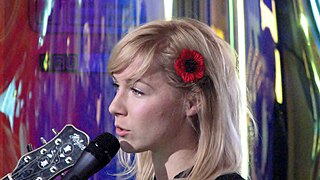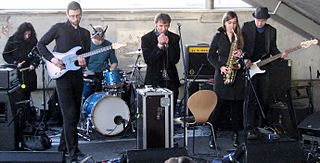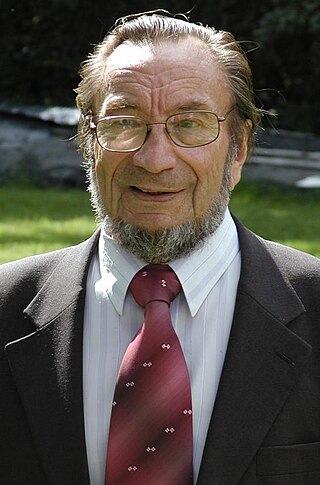
Lenna Kuurmaa is an Estonian singer-songwriter and actress. She is a member of the girl group Vanilla Ninja, but after the band's hiatus since 2009, continued to work as a solo-artist. She also formed a band with the name "Lenna" who released the debut album Lenna in June 2010.
Eesti Televisioon (ETV) is an Estonian free-to-air television channel owned and operated by Estonian Public Broadcasting. It made its first broadcast on 19 July 1955.

Michael Pärt is an Estonian music producer and music editor.

Evelin Samuel is an Estonian singer, songwriter, musical theater performer, author of children's books and participant in the Eurovision Song Contest.

Eesti Rahvusringhääling (ERR) – Estonian Public Broadcasting – is a publicly funded and owned radio and television organisation created in Estonia on 1 June 2007 to take over the functions of the formerly separate Eesti Raadio (ER) and Eesti Televisioon (ETV), under the terms of the Estonian National Broadcasting Act. The first chair of ERR is Margus Allikmaa, the former chair of Eesti Raadio. Present CEO is Erik Roose.
Radio Kuku is an Estonian radio station. It was the first politically independent privately owned radio station in post-occupation Estonia, established in 1992 by a media businessman and later politician Rein Lang and a founder of the first politically independent newspaper Eesti Ekspress, Hans H. Luik.
Eesti Ekspress is an Estonian weekly newspaper.
Since 1991 Estonia has changed from being a former Soviet republic to a member of the European Union and the European Monetary Union, making a rapid transformation in several fields, including the mass media, which is a vibrant and competitive sector. For many years Estonia has been among the top ten in Reporters Without Borders’ (RSF) Press Freedom Index. In 2017 it was ranked 12th out of 180 countries by RSF while Freedom House assigned Estonia’s press freedom a score of 16/100. A cross-media landscape that embraces traditional media as well as the Internet and digital media characterises the contemporary media system in Estonia.
Estonia participated in the Eurovision Song Contest 2009 with the song "Rändajad" written by Sven Lõhmus. The song was performed by the group Urban Symphony. The Estonian broadcaster Eesti Rahvusringhääling (ERR) organised the national final Eesti Laul 2009 in order to select the Estonian entry for the 2009 contest in Moscow, Russia. Ten songs competed in the national final and the winner was selected over two rounds of voting. In the first round, a jury panel and a public vote selected the top two to qualify to the superfinal. In the superfinal, "Rändajad" performed by Urban Symphony was selected as the winner entirely by a public vote.

Fred Jüssi is an Estonian biologist, nature writer and photographer.
Eesti Raadio was the public service radio broadcaster of Estonia that, at the time of closure, operated five national radio stations. It was closed in 2007 as a result of a merger with Eesti Televisioon to form the Estonian Public Broadcasting service, or Eesti Rahvusringhääling (ERR).
Estonia participated in the Eurovision Song Contest 2012 with the song "Kuula" written by Ott Lepland and Aapo Ilves. The song was performed by Ott Lepland. The Estonian broadcaster Eesti Rahvusringhääling (ERR) organised the national final Eesti Laul 2012 in order to select the Estonian entry for the 2012 contest in Baku, Azerbaijan. The national final consisted of three shows: two semi-finals and a final. Ten songs competed in each semi-final and the top five from each semi-final as determined by a jury panel and public vote qualified to the final. In the final, the winner was selected over two rounds of voting. In the first round, a jury panel and a public vote selected the top two to qualify to the superfinal. In the superfinal, "Kuula" performed by Ott Lepland was selected as the winner entirely by a public vote.

Elina Born is an Estonian singer. She represented Estonia in the Eurovision Song Contest 2015 along with Stig Rästa with the song "Goodbye to Yesterday". She previously attempted to represent Estonia in the Eurovision Song Contest in 2013 with the song "Enough", and attempted to represent Estonia at the Eurovision Song Contest in 2017 finishing last in the final. She was the runner-up of the fifth season of Eesti otsib superstaari.

Raul-Stig Rästa is an Estonian singer and songwriter who, along with singer Elina Born, represented Estonia in the Eurovision Song Contest 2015 with the song "Goodbye to Yesterday".

Kreatiivmootor is an Estonian band, brought into existence in 2003 by an academic philosopher Roomet Jakapi, PhD, and a lawyer Allan Plekksepp, PhD, who had intended to make music without genre or scene constraints. Their alternative style has ranged from eccentric experimentalism to psychedelic pop. After expanding to become an octet in 2008, the band has used computer programmes, live electronics, guitars, bass, sax, percussion and drums in their live performances. Apart from releasing three albums and standing up at Tallinn Music Week, they have also performed at other festivals, such as Waves Vienna, Positivus in Latvia, Brainlove Festival of Brainlove Records in the UK and Sergey Kuryokhin International Festival in Russia.
Estonia participated in the Eurovision Song Contest 2018 with the song "La forza" written by Mihkel Mattisen, Timo Vendt, Ksenia Kuchukova and Elina Nechayeva. The song was performed by Elina Nechayeva. The Estonian broadcaster Eesti Rahvusringhääling (ERR) organised the national final Eesti Laul 2018 in order to select the Estonian entry for the 2018 contest in Lisbon, Portugal. The national final consisted of three shows: two semi-finals and a final. Ten songs competed in each semi-final and five from each semi-final as determined by a jury panel and public vote qualified to the final. In the final, the winner was selected over two rounds of voting. In the first round, a jury panel and a public vote selected the top three to qualify to the superfinal. In the superfinal, "La forza" performed by Elina Nechayeva was selected as the winner entirely by a public vote.

Raadio 2 is Estonian radio station. It belongs to Estonian Public Broadcasting and started broadcasting on 1 May 1993.
Ela Tomson is an Estonian television journalist, editor, screenwriter, and politician. She was a member of X Riigikogu.

Ülo Tootsen was an Estonian biologist, journalist, publisher, editor, translator, and politician. He was a member of IX Riigikogu, representing the Estonian Centre Party.

Jüri Lina is an Estonian journalist, writer, paranormal investigator, music producer, radio host, film director and ufologist.











